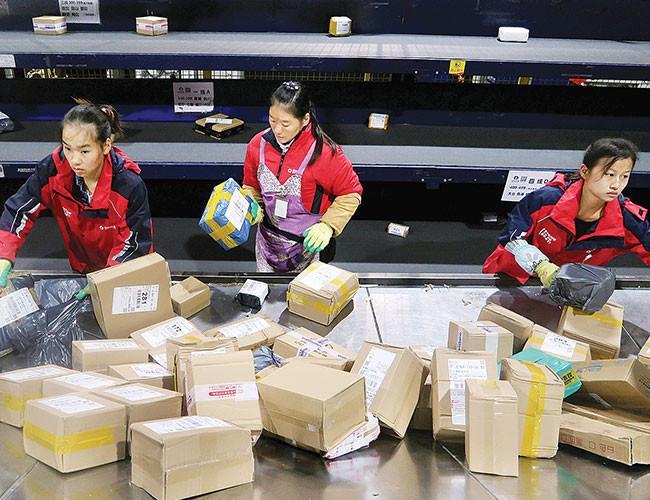
China’s smartphone-wielding masses unleashed billions of dollars in e-commerce spending on Nov. 11 as they rushed to snap up bargains on “Singles Day” - billed as the world’s biggest one-day online shopping festival.
Also known as “Double 11” for the Nov. 11 date, the event launched in 2009 by e-commerce giant Alibaba kicked off at midnight and ended up shattering the previous year’s sales mark, as it does every year.
Chinese online shoppers spent a record $25 billion on this year’s “Singles Day” promotion by giant Alibaba, up nearly 40 percent from last year, figures showed yesterday. At the peak, 256,000 payments were being processed per second on Novb 11, the firm said, more than 90 percent of them placed via mobile.
Alibaba rivals such as JD.com also reported brisk business.
The yearly display of rising Chinese consumer spending power has become crucial for manufacturers and retailers across the country, accounting for a significant share of annual orders for many businesses.
Five minutes after midnight, Alipay was processing 256,000 payment transactions per second, doubling last year’s high-water mark, Alibaba said.
More than 90 percent of Alipay orders were placed via mobile, the majority on Alibaba’s main e-commerce platform Taobao.com.
More than half of China’s 1.3 billion people use smartphones, which have become central to daily life, used for messaging, shopping, news and entertainment, ordering taxis and meals, and serving as digital wallets for a range of point-of-sale purchases.
The day’s transaction volumes are pumped up by many Chinese delaying purchases of mundane items like rice and toilet paper to take advantage of cut-rate prices.
Alibaba launched “Singles Day” as the Chinese online answer to the late-November U.S. “Black Friday” shopping rush, capitalising on the Chinese love of a good bargain and the growing national addiction to one-click smartphone payments.
E-commerce’s huge growth in China has put New York-listed Alibaba neck-and-neck with Amazon as the world’s most valuable e-commerce company, while also making Nasdaq-listed JD.com a Fortune 500 company.
Alibaba and JD stock have both doubled this year as revenues surged.
Alibaba is investing heavily in creating an entire user ecosystem encompassing cloud computing, artificial intelligence, automated stores using face-recognition, and is pushing into overseas markets under much-travelled boss Jack Ma, one of China’s richest men.
But environmentalists accuse Alibaba and other e-tailers of fuelling a culture of excessive consumption and mountains of waste.
Greenpeace said “Singles Day” deliveries last year created 130,000 tons of packaging waste - less than 10 percent of which is recycled.
It said e-commerce is actually more carbon-intensive than brick-and-mortar shopping, calling “Singles Day” a “disaster for the environment.”
Manufacturing for online buyers
But the growth of Chinese e-commerce has proved a boon to hundreds of once-backward interior towns and villages, now dubbed “Taobao villages” after re-orienting their local economies toward manufacturing for online buyers.
Analysts say Alibaba will take “Singles Day” global as Chinese e-commerce growth rates are expected to slow in years ahead.
It already has a substantial stake in Lazada, an online retailer in Southeast Asia - a hot e-commerce battleground - and recently launched an electronic trading hub in Malaysia, its first outside China.
Alibaba said hundreds of millions of Southeast Asian consumers will be able to access Taobao this “Singles Day.”
“This is just the start. We will see tens of billions of dollars injected abroad [by Alibaba],” said Li Chengdong, a Beijing-based independent e-commerce analyst. “It could end up dominating e-commerce in developing countries.”